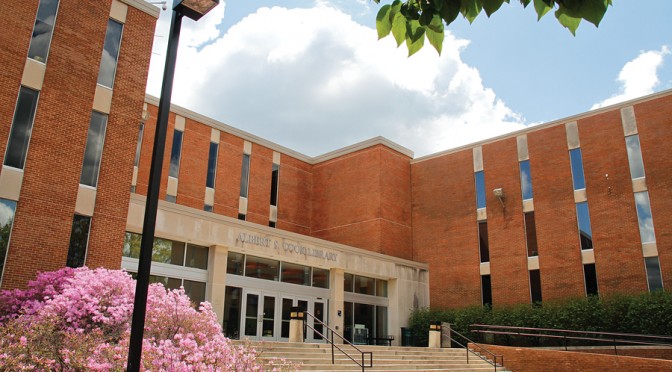
Library officials apologize for racially-charged tweet
By: Marcus Dieterle, Staff Writer
On Oct. 21, Cook Library officials apologized and offered context for a controversial throwback picture posted by the Special Collections Twitter account Oct. 19.
The image depicted two women hanging an effigy, representing the Loyola mascot, by its neck from a tree during a 1953 Homecoming celebration. After students denounced the photo, saying it depicted a lynching and was insensitive to black students, Cook Library removed the tweet and posted an apology.
The first apology was also eventually removed and replaced with a second apology from Dean of University Libraries Deb Nolan.
“The tweeting of this depiction of a lynching is unacceptable, as it contradicts our university’s commitment to provide a thriving, bias-free campus for all students,” Nolan said in the apology. “The use of that photo also runs contrary to this university’s relentless pursuit of diversity and inclusion.”
Research and Instruction Librarian Sarah Gilchrist explained that the tweet was meant to show Towson’s first Homecoming Queen, while the controversial photo just happened to be on the same page.
According to Gilchrist, the offensive image was taken two years after the first black woman applied to Towson and was denied admission.
“The choices that were made that day were not choices that I had any idea that’s how it would affect other people, because in my background effigies are not linked to lynching, and so that is not a connection I was making when I looked at those pictures,” Special Collections & Archives Library Associate Felicity Knox said. “I certainly will never not make that connection again.”
Knox, who posted the tweet containing the image, went on to personally apologize.
For junior Breya Johnson, who is a member of the Organized Network of Student Resistance, the issue went beyond the original offensive image and lay more with Cook Library’s handling of the controversy in its first apology.
“It was an apology but then there was a ‘but’ after it and it just completely negated that apology,” Johnson said.
Gilchrist acknowledged students’ pain and said this incident will make the Cook Library staff more conscious of these issues moving forward. Sometimes, she said, repeated view of historical material makes things like violent acts seem commonplace, though they should be shocking.
Associate Vice President for Student Affairs & Diversity Santiago Solis said after becoming aware of the tweet and students’ responses, he was hurt by the fact that students wanted to leave Towson because they felt unsafe or unwanted.
“That hurts me tremendously because I don’t want them to be here just waiting to graduate so they can leave because they feel unloved and uncomfortable,” Solis said. “They’re not just seeing this as a first time. They’re seeing this as ongoing.”
While Towson keeps records of university proceedings and large events on campus, Head of Special Collections and University Archives Ashley Todd-Diaz said the experiences of student activists and student groups are not as well documented.
Solis said everyone has a different lens that they see the world through which can lead to blindspots when dealing with diversity issues. He also said people sometimes choose not to acknowledge prejudice in their history because they are unsure of how to discuss it, and accountability and cultural competency are never-ending processes.
“We know we’re never going to reach a perfect level of being culturally competent, that we’re going to continue learning for the rest of our lives,” Solis said. “So therefore we’re always going to be missing something from our perspective and understanding. So that’s where we engage, engage and engage.”

